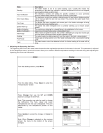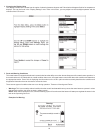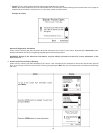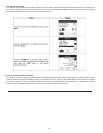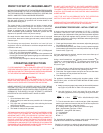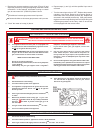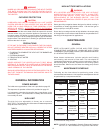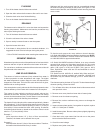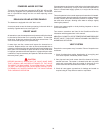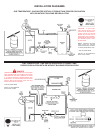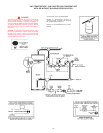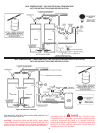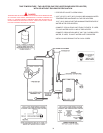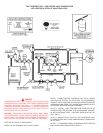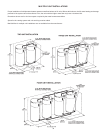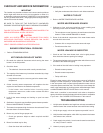
29
POWERED ANODE SYSTEM
To insure a long, trouble-free operating life, BTH 300, 400 and 500
are factory equipped with a powered anode system. The anodes
are of a permanent design and do not need replacing unless
damaged.
DRAIN VALVE AND ACCESS PANELS
The heaters are equipped with a 3/4" drain valve.
An access panel covers the cleanout opening in the tank which is
sealed by a gasket and cover, see Figure 24.
RELIEF VALVE
At least twice a year, the temperature and pressure relief valve should
be checked to ensure that it is in operating condition. To check the
relief valve, lift the lever at the end of the valve several times. The
valve should seat properly and operate freely.
If water does not ow, remove and inspect for obstructions or
corrosion. Replace with a new valve of the recommended size as
necessary. Inspection of the valve should be performed at least every
three years. Do not attempt to repair the valve, as this could result
in improper operation and a tank explosion. In areas with poor water
conditions, it may be necessary to inspect the T&P valve more often
than every three years.
CAUTION
BEFORE MANUALLY OPERATING THE VALVE, MAKE SURE
THAT A DRAIN LINE HAS BEEN ATTACHED TO THE VALVE
TO DIRECT THE DISCHARGE TO AN OPEN DRAIN. FAILURE
TO TAKE THIS PRECAUTION COULD MEAN CONTACT WITH
EXTREMELY HOT WATER PASSING OUT THE VALVE DURING
THIS CHECKING OPERATION.
If the temperature and pressure relief valve on the heater discharges
periodically or continuously, it may be due to thermal expansion of
water in a closed water supply system, or, it may be due to a faulty
relief valve.
Thermal expansion is the normal response of water when it is heated.
In a closed system, thermal expansion will cause the system pressure
to build until the relief valve actuation pressure is equaled. Then,
the relief valve will open, allowing some water to escape, slightly
lowering the pressure.
Contact your water supplier or local plumbing inspector on how to
control this situation.
Two common corrections are listed in the Checklist and Service
Information which appears later in this manual.
ABOVE ALL, DO NOT PLUG THE TEMPERATURE AND PRESSURE
RELIEF VALVE. THIS IS NOT A SOLUTION AND CAN CREATE A
HAZARDOUS SITUATION.
VENT SYSTEM
Examine the vent system every 3 months. Points of inspection are
as follows:
1. Check for obstructions and/or deterioration of vent piping and
vent hood. Replace immediately where needed.
2. Vent pipe and vent hood screen should be cleaned of foreign
material and soot. The screen is located inside the vent hood
outlet and is accessible from the outside of the hood. Do not
reach inside the vent hood when the heater is in operation.
3. Check all vent system connections for leakage and reseal as
required using Hi Temp Silicone sealer or equivalent.



